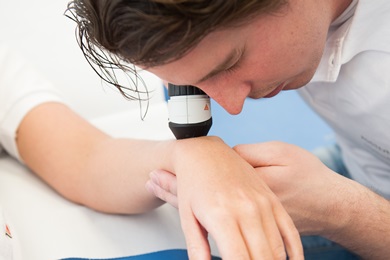What is skin cancer?
The three most common types of skin cancer are basal cell carcinoma, squamous cell carcinoma and melanoma. There are many forms in which these skin cancer types can express themselves. Basal cell carcinoma classically appears as a lesion with a pearly translucent to fleshy color. It often has thin blood vessels on the surface, and sometimes ulceration is present. The key term for recognising basal cell carcinoma, however, is translucency. The most frequent presentation of squamous cell carcinoma is as a red patch or bump, that is either crusted or scaly. Squamous cell carcinoma is often a very quickly proliferating tumor. A melanoma can be recognised by its irregular border and asymmetrical pigmented area. It is often wider than 0.5 cm in diameter. UV-light accounts for most of the cases of skin cancer. It is therefore, that risk factors for the development of skin cancer are among others: sunny vacations, working outside and living in proximity tot he equator. Melanoma can also be interited. The dermatologist will therefore always ask whether there are reported cases of melanoma among members of the family.
Treating skin cancer
If the skin check for cancer shows that you have been diagnosed with melanoma, there are many options for treatment. The treatment depends on the type of skin cancer. see here for more information in Dutch. sometimes it is possible to threat basal cell carcinoma with a cream. Most often, however, it is necessary to excise the skin cancer. The experienced dermatologists of the Roosevelt clinics are very skilled dermato-surgeons. After removal of the melanoma, an additional excision will be made around the scar. This is in compliance with the Dutch guidelines for the treatment of melanoma. In very rare cases, it appears to be necessary to refer to an academic medical centre.
Costs for a skin check for cancer at the Roosevelt clinics
If you are referred to the Roosevelt clinics by your dermatologist, the costs for the procedure will be payed by your health insurance. It is also possible, however, to get a skin check for cancer, without being referred by your general practitioner. You can check the costs for the total body skin check for cancer here. You will be informed if the dermatologist observes any suspected skin lesions. When anything suspectible is found, the lesions can be surgically removed and send to a pathologist for analysis. This will bring additional costs. For a pricelist check here or ask your dermatologist what the cost will be. If treatment is necessary, it is most often advisable to get a referral from your general practitioner.
Make an appointment with the dermatologist, click here.
